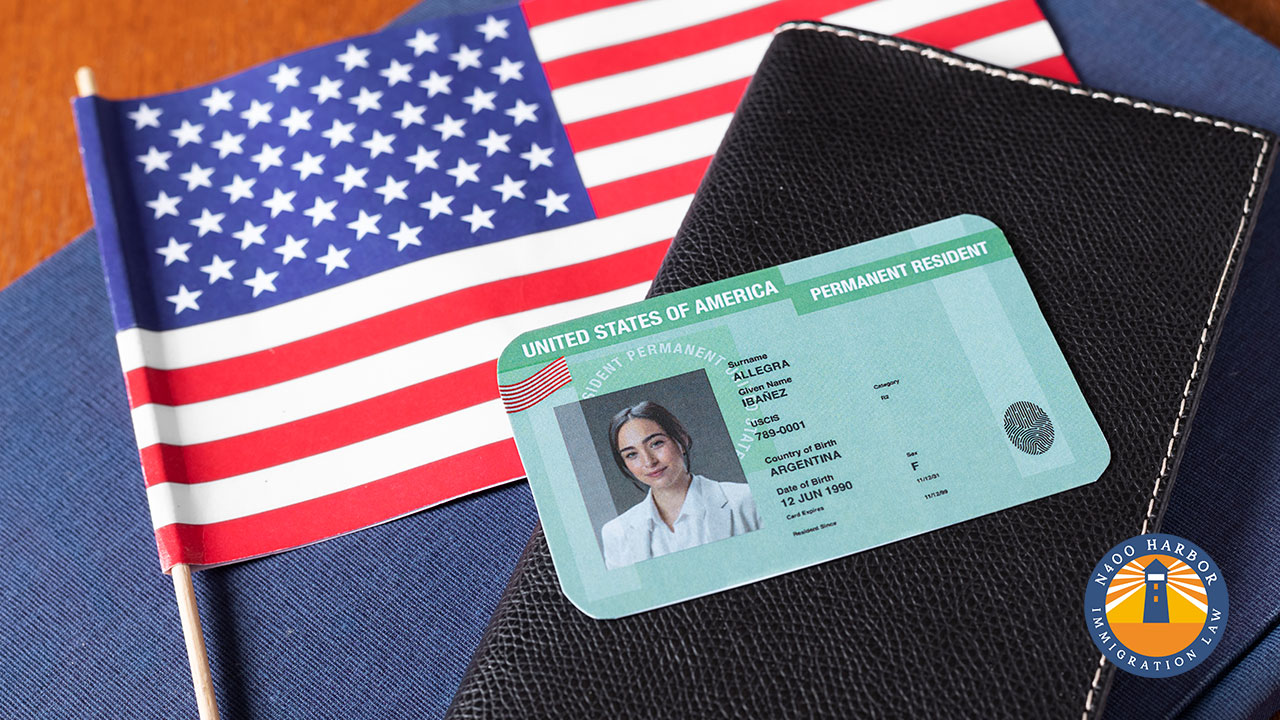
Understanding the Green Card eligibility requirements
Welcome to our comprehensive guide on the Green Card eligibility, a coveted immigration benefit that grants permanent residence in the United States. At N400 Harbor Immigration Law, we understand the importance of accurate information and guidance for navigating the complexities of immigration law.
In this article, we will delve into the intricacies of the Green Card eligibility requirements, the application process, and benefits of having a Green Card. Our aim is to provide you with the most up-to-date and detailed information to help you understand and obtain the Green Card.
IN THIS ARTICLE
What is a Green Card?
A Green Card, officially known as a Permanent Resident Card, is a document issued by the U.S. government to foreign nationals granting them the right to live and work permanently in the United States. It is a coveted immigration benefit that provides a path to lawful permanent residence, which is a stepping stone towards U.S. citizenship.
Holding a Green Card opens up a world of opportunities, allowing individuals to live, work, study, and travel freely in the United States, and enjoy various benefits and protections.
Green Card Eligibility
Obtaining a Green Card is a dream for many immigrants, but it is not available to everyone. There are various pathways related to Green card eligibility, and the requirements may vary depending on the category under which an individual is applying.
Here are some common ways to become eligible for a Green Card:
- Family Sponsorship: U.S. citizens and lawful permanent residents can sponsor certain family members, including spouses, parents, children, and siblings, for a Green Card.
- Employment: Certain job offers from U.S. employers can lead to a Green Card, particularly in fields where there is a shortage of U.S. workers.
- Investment: Foreign investors who make a substantial investment in a U.S. business and create jobs for U.S. workers may qualify for a Green Card.
- Refugee or Asylee Status: Refugees and asylees who have been granted protection in the United States can apply for a Green Card after meeting certain requirements.
- Special Immigrant Status: Certain individuals, such as religious workers, juveniles, and crime victims, may be eligible for a Green Card under special immigrant categories.
It is important to note that eligibility requirements can be complex and subject to change. Consulting with an experienced immigration attorney or qualified legal professional can greatly help in understanding and navigating the Green Card eligibility criteria.
“Holding a Green Card opens up a world of opportunities in the U.S.”
Green Card eligibility via Family Sponsorship
Individuals who are related to U.S. citizens or permanent residents can apply for a green card to live and work in the United States permanently. There are two main categories of family-based immigration:
- Immediate Relative: This category includes spouses, unmarried children under the age of 21, and parents of U.S. citizens. There is no limit on the number of visas that can be issued to immediate relatives.
- Family Preference: This category includes unmarried children over the age of 21, married children of any age, and siblings of U.S. citizens. There is a limited number of visas that can be issued each year for family preference categories.
To be eligible for a green card through family sponsorship, the petitioner (the U.S. citizen or permanent resident) must file a petition on behalf of the beneficiary (the foreign national). The beneficiary must also meet certain eligibility requirements, such as passing a background check and attending an interview at a U.S. embassy or consulate abroad.
It’s important to note that the process for obtaining a green card through family-based immigration can be complex and time-consuming, and there may be lengthy wait times depending on the specific category and country of origin. We strongly advise that you hire a licensed attorney to help you with this process.
RESOURCE: Family based Immigration
Employment-based Green Card Eligibility
Getting a Green Card through Employment is another way to obtain permanent residency in the United States. The process typically involves an employer sponsoring the foreign worker for a Green Card, and there are several eligibility requirements that must be met.
First, the employer must obtain a labor certification from the U.S. Department of Labor, which involves demonstrating that there are no qualified U.S. workers available for the position. The employer must also demonstrate that they have the financial ability to pay the worker’s salary.
Once the labor certification is approved, the employer can file an Immigrant Petition for Alien Worker (Form I-140) with U.S. Citizenship and Immigration Services (USCIS). The worker must also submit a Green Card application (Form I-485) and attend an interview.
There are several categories of employment-based Green Cards, including EB-1 for individuals with extraordinary abilities, EB-2 for individuals with advanced degrees or exceptional ability, and EB-3 for skilled workers, professionals, and other workers. There are also additional categories for investors, religious workers, and other specialized occupations.

Green Card Application for Investors
To obtain a Green Card as an investor, one must apply for an EB-5 visa. This visa program requires the foreign investor to make a substantial investment in a new commercial enterprise in the United States, which creates or preserves at least 10 full-time jobs for qualifying U.S. workers.
To be eligible for the EB-5 program, the investor must invest at least 800,000 (if the investment is made in a targeted employment area, otherwise it is $1,050,000). The investor must also demonstrate that the investment funds were obtained from lawful sources and that the funds have been transferred to a qualifying business entity.
Once the investment is made and the job creation requirement is met, the investor may file an I-526 petition to obtain conditional permanent residency in the United States. If the petition is approved, the investor and their eligible family members may apply for a Green Card through adjustment of status or consular processing.
It is important to note that the EB-5 program has strict requirements and regulations, and applicants should consult with an experienced immigration attorney to ensure that they meet all eligibility requirements and file their application correctly.
Refugee or Asylee Status
Green Card eligibility through refugee or asylee status is available to individuals who have been granted asylum or refugee status in the United States. To apply for a Green Card, the individual must have been physically present in the United States for at least one year after being granted asylum or refugee status.
To apply for a Green Card, the individual must complete Form I-485, Application to Register Permanent Residence or Adjust Status, and submit it to U.S. Citizenship and Immigration Services (USCIS) along with supporting documentation, such as evidence of refugee or asylee status, identity documents, and medical examination records.
It’s important to note that individuals who have been convicted of certain crimes or who have engaged in certain activities may be ineligible for a Green Card through refugee or asylum status. Please consult with an experienced immigration attorney in the United States to ensure all requirements are met and the application is properly filed.
Green Card Application Process
The Green Card application process involves multiple steps and requires careful attention to detail. Here is a general overview of the process:
- Determine Eligibility: As discussed above, it is crucial to ascertain eligibility based on the specific category under which you are applying.
- File Petition or Application: Depending on the category, the petitioner or applicant must file the appropriate form with the U.S. Citizenship and Immigration Services (USCIS).
- Wait for Processing: After the petition or application is submitted, it will be reviewed by USCIS, and additional evidence or information may be requested. Processing times can vary, and it is important to be patient during this stage.
- Attend Biometrics Appointment: If required, applicants will need to undergo a biometrics appointment to provide fingerprints, photographs, and other biographic information.
- Attend Interview: In some cases, USCIS may schedule an interview to evaluate the eligibility of the applicant. Preparation for the interview is crucial, as it may determine the outcome of the application.
- Receive Decision: After the USCIS reviews the application and supporting documents, a decision will be made, and the applicant will be notified. If approved, the applicant will receive a Green Card.
It is important to note that the Green Card application process can be complex and time-consuming, with various documentation requirements and potential challenges. Seeking the assistance of an experienced immigration attorney can greatly improve the chances of a successful outcome.
Benefits of a Green Card
Holding a Green Card comes with a plethora of benefits that make it a highly sought-after immigration status. Here are some key advantages of obtaining a Green Card:
- Permanent Residence: A Green Card grants the holder the right to live and work permanently in the United States, without the need for renewals or extensions.
- Employment Opportunities: Green Card holders can work for any employer in the United States and pursue any lawful employment opportunity.
- Education: Green Card holders have access to education and training opportunities in the United States, including public schools, colleges, and universities.
- Social Security Benefits: Green Card holders may qualify for Social Security benefits, including retirement, disability, and survivor benefits.
- Travel: Green Card holders can travel internationally without a need for a visa to re-enter the United States.
- Path to Citizenship: Holding a Green Card is a significant step towards obtaining U.S. citizenship, which comes with additional rights and privileges.
Note:
It is worth mentioning that Green Card holders also have certain responsibilities, such as maintaining residence in the United States, obeying U.S. laws, and fulfilling tax obligations. Failure to comply with these responsibilities can result in the revocation or abandonment of the Green Card.
Our thoughts
In conclusion, the Green Card is a valuable immigration benefit that grants permanent residence in the United States, opening up a world of opportunities for individuals and their families. Eligibility requirements and the application process can be complex, and it is essential to understand and comply with the rules and regulations set forth by the U.S. government. If you are considering applying for a Green Card, it is highly recommended to seek the guidance of an experienced immigration attorney or qualified legal professional to navigate the process with confidence.
At N400 Harbor Immigration Law, we are committed to providing reliable and up-to-date information on immigration topics, including the Green Card. Our comprehensive guide aims to provide you with valuable insights to help you understand and obtain this coveted immigration benefit. For further information and personalized assistance, please contact our team of experts today.

